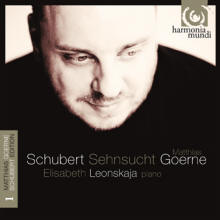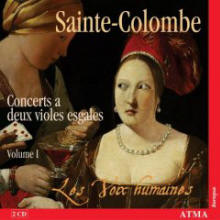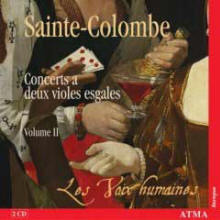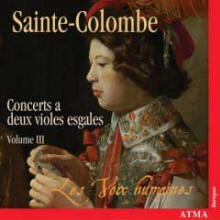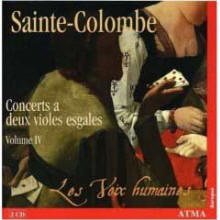|
You are reading the older HTML site Positive Feedback ISSUE may/june 2008
Notes of an Amateur - May, 2008,
Part 1
Schubert Edition/Matthias Goerne, Volume 1 . Matthias Goerne, baritone; Elisabeth Leonskaja, piano. Harmonia Mundi HMC 901988. It is a fine commentary on how healthy the supposedly ill classical recording industry is that Harmonia Mundi would begin an "extensive series" of Schubert lieder in 2008. It makes me feel we live in an ideal world rather than the real one around us. Who is the premier Schubert voice in the world? The best since his teacher, Fischer-Diskau? Despite the fact that in the recent past, Hyperion issued a complete 40+ CD edition of Schubert's lieder (in which he appears at least three times), don't we really want to hear him sing as many more of them as possible? In an ideal world. Baritone Matthias Goerne has power and sweetness in perfect proportion. He takes this music into his strong and perfect hands and delivers it to the rapt silence of anyone within listening distance. He already has a considerable discography of Schubert (and Schumann, among others), but clearly this is a statement project. Somebody somewhere in Harmonia Mundi with great judgment and authority both has decided this has to be done. Probably the same Somebody who got Planés Schubert piano sonata series released as a set. Somebody with the authority to make the ideal real. What with Goerne, Planès, cellist Queyras, and pianist Paul Lewis, Harmonia Mundi is building quite a stable. I have heard Goerne often but never quite like this. The sternness I seem to remember in his early recordings gave them a sense of authority that was impossible to ignore, but it brought with it a measure of aloofness too. In these songs, his great bear of a voice has shed just enough of that early coolness to become absolutely magnetic. The fifteen songs that comprise this first volume of the series represent nearly the full range of Schubert's life, from D. 113 to D. 938. Their texts are hard to take on their own terms—extravagantly romantic, the early nineteenth century as its most melodramatic in the poetry of German romantics Leitner, Schiller, Mayrhhofer, and Goethe. It is just as well it's all in German! The music, however, travels powerfully into our time. As with most romantic lied, I skim the texts to see what's mainly up and then set them aside to let the composer have his way, which, when it's Schubert he invariably does. This recording is self-recommending for Schubert and lieder fans. For the rest of you, even those with cold feet, I can think of no better recording to begin with.
Sainte-Colombe, Concerts for Two Violes. Volumes 1-4. Les Voix Humaines. ATMA classique. ACD2 2275, 2276, 2277, and 2278. Before there was Marain Marais, beloved bass viol composer and performer of the French baroque, there was his teacher, Saint-Colombe, about whom little is known. Some of what we do know (or thought we knew) was fictionalized memorably in Alain Corneau's delightful French film, Tous les Matins du Monde, based on a 1991 novel of the same name by Pascal Quignard. Starring actor Gerard Dépardu as Marais and Jordi Savall's bass viol as the heart of the film's soundtrack, the film gives us hints of Sainte-Colombe as a reclusive lyric genius who wrote and played music on the viol with enormous discipline and exquisite touch, all to bring his deceased wife back to life. Savall has recorded two CDs of Saint-Colombe's music for solo viol, one of his suites for two. Margaret Little and Susie Napper, who are Les Voix Humaines, have recorded eight CD's of the suites for two, giving us all 67 of his works for the two instruments. This is music for two equal voices, by the way, not one voice with a continuo. Way too few of us know of these recordings, which give us a Sainte-Colombe who is sonorous, restrained, eloquent, and at time heart-breaking. That ATMA would devote eight CD's to this music is to their everlasting credit. They have become among my favorite recordings. If you consider yourself a fan of the cello and don't know Saint-Colombe's work (or Marais' for that matter), you have hours of delight in store. A bass viol can do things a cello cannot, partly because of the instrument itself, partly because of the earlier instrument's bow, which was designed to be more flexible than a modern cello bow, at the cost of not being able to play at the cello's volume in large rooms. The viol is a true chamber instrument, which produces an intimate, sinewy, coppery sound that can wrap itself around a feather without damaging it. It can wail, sigh, hum, sing, flaunt, dart, swell, ebb, dance. It can be enormously reflective, rich or subtle, jumping gracefully from one sound to the other. In the hands of these two highly skilled musicians, Saint-Colombe's bass viol 'concerts'—or suites, as we call them when we get to Bach's—are as moving to me as anything from the better known Marais. Each is made up of a handful of short movements called by the names of dances, as we expect, but which often sway and wander more than dance. They are mainly melancholy, melancholy being a more fruitful state of mind for art than happiness, as we know. I urge you to start out with one of these albums, each of which offers a pair of CD's. If your musical sensibilities are anything like mine, you'll be back for more.
Handel, Organ Concertos, Opus 4 . Academy of Ancient Music, Richard Egarr, organist and director. Harmonia Mundi HMC 807446. (SACD) Many of us fell in love with these infectious concertos in our musical youth and then came to decide after many listenings that we had outgrown them. Written to be played between the acts of his operas as diversions to keep the audience's mind off the scenery change going on behind them, they are just that. Diversions, confections—easy to love but off by themselves, surely not substantial enough to stick to the ribs. This recording was sent as a gift, which I ungraciously set aside and then picked up the other day for sentimental reasons. Good thing I did. This is far and away the best performance and recording of this music I can remember: Egarr and his people make a strong case for the solidity and excellence of these concertos without sacrificing any of their charm and grace. If you are a Handel buff, you'll love them. If you're new to the composer, you'll love them. I love them. Egarr is bringing new life to the Academy—all of the old energy is here but a new level of eloquence and beauty as well. The sound is as good as the performances—it's recorded in DSD and is a hybrid CD/SACD but don't let that stop you. The CD layer is terrific. System used for these auditions: Audio Note CDT3 transport and Dac 4.1 Balanced Signature, Blue Circle FtTH hybrid integrated amplifier, Jean Marie Reynaud Orfeo speakers. With Blue Circle BC6000 line conditioner. Audio Note Sogon and AN-Vx interconnects and Lexus speaker cable. Bob Neill, in addition to being an occasional equipment and regular music reviewer for Positive- Feedback Online, is also proprietor of Amherst Audio in Amherst, Massachusetts, which sells equipment from Audio Note, Blue Circle, Manley Labs, and JM Reynaud, among others.
|

